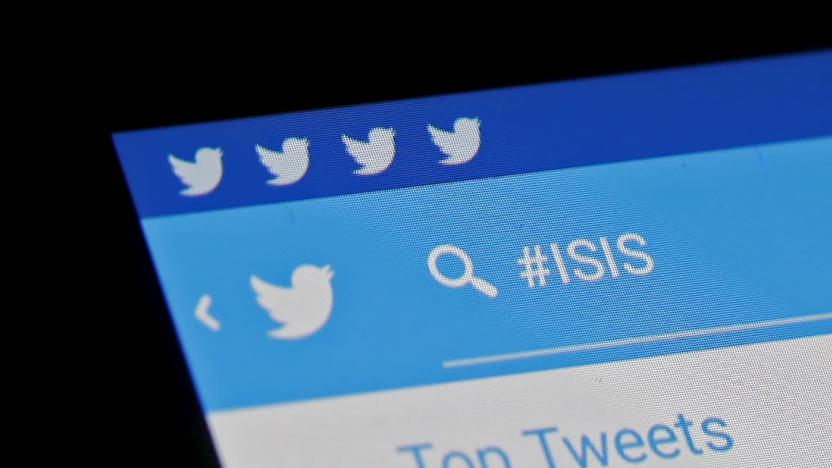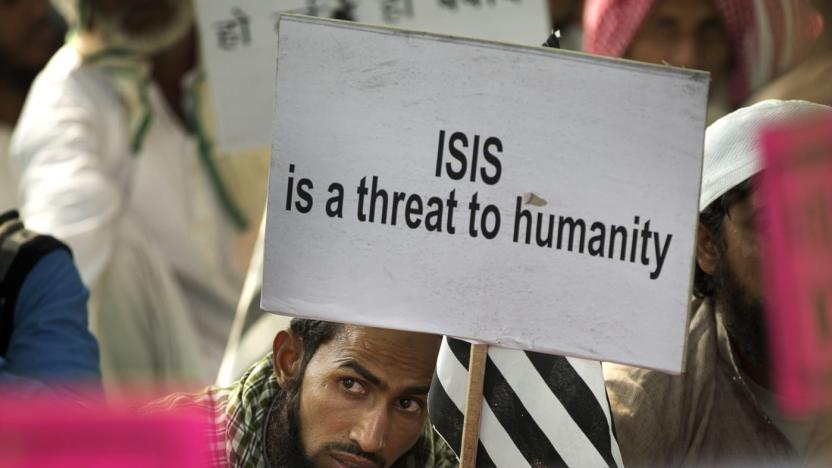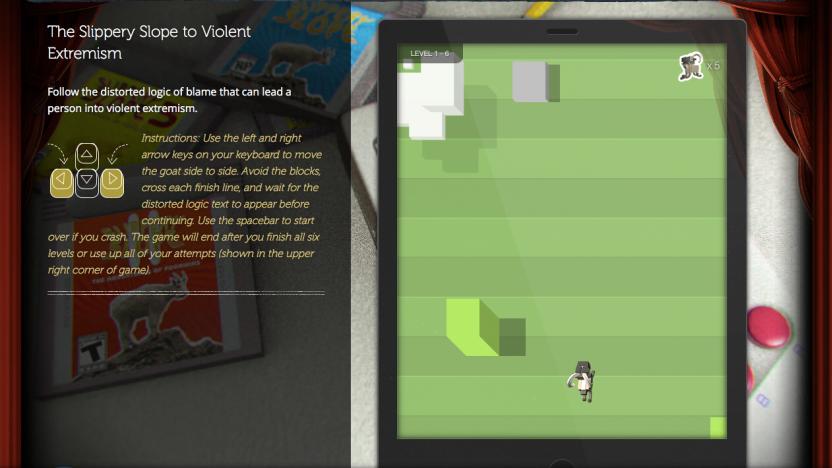extremism
Latest

Twitter was quick to pull extremist tweets following Nice attack
Twitter's response to online extremism has changed a lot in the past few years. Observers at observer groups like the Counter Extremism Project report that the social network was exceptionally speedy in removing pro-extremist accounts and tweets in the hours following the truck attack in Nice, France on July 14th. It moved with "swiftness we have not seen before," CEP says. Twitter hasn't commented on the specific actions, but it's apparent that the company is serious about its ban on terrorism.

ISIS' Twitter traffic reportedly dropped 45 percent in 2 years
If you ask the US government, the efforts to stifle ISIS' online propaganda are paying off. The White House reports that the extremist group's Twitter traffic has dropped 45 percent in the past 2 years, owing to both attempts to keep accounts offline and a surge of countering messages. To some extent, it was just a matter of getting up to speed. Officials admit that they made mistakes early on in fighting ISIS' online messaging (such as producing a lot of opposing statements in Engilsh), but they say they've both made more relevant content and done a better job of coordinating internet campaigns with its military strategy.

Iraqis use off-the-shelf drones to battle ISIS
Let's say you're leading an Iraqi militia. You want to reconnoiter ISIS fighters' positions, but you don't have the budget for military-grade UAVs or helicopters. What to do? For the Iraqis themselves, the answer is simple: buy everyday drones. As Wired notes, both Shia militias and Iraqi officials are using consumer drones bought in hobby and toy stores (like DJI's Phantom line) to observe ISIS positions and help call artillery strikes. They seldom last for more than 40 minutes in the air, but that's enough to provide a heads-up and improve accuracy.

ISIS worries that fake Android apps are spying on its ranks
ISIS' attempts to disseminate its extreme message through mobile apps might be backfiring. Motherboard has learned that the group is warning members of fake, malware-laden versions of its Android apps that allegedly spy on users. While it's not clear who's creating the apps (besides "dubious sources"), it's implied that at least one government is trying to snoop on ISIS through unsuspecting members. Those militants can't just stick to 'official' sources to be safe, either -- ISIS' official channels frequently go down, so many of those backing the group's hateful cause have no choice but to go through unofficial routes.

Twitter reportedly struggles to keep ISIS accounts offline
Twitter may be having some success in reducing ISIS' online presence, but it's undoubtedly facing an uphill battle. Threat intelligence outlet Recorded Future estimates that Twitter deleted over 26,000 pro-ISIS accounts in March, but saw 21,000 accounts created that same month. That's three times as many new accounts as ISIS supporters made back in September. If the figures are accurate, they suggest that Twitter is fighting to keep above water -- it can only do so much to purge accounts that are frequently recreated shortly after they're removed.

Pro-ISIS hackers threaten Facebook and Twitter over crackdowns
Surprise: ISIS isn't happy that social networks are taking down accounts sympathetic to its cause. Vocativ has obtained a video from a pro-ISIS hacking group that threatens retaliation against Facebook and Twitter for joining the US' campaign to fight online terrorist propaganda. The clip insists that the group will take 10 accounts for every one that Facebook or Twitter shuts down, and promises to eventually "delete" the sites entirely. There's also a segment where images of Facebook's Mark Zuckerberg and Twitter's Jack Dorsey are riddled with bullet holes.

The FBI teaches teens about extremism with a game that defies logic
The FBI recently fired up a new site urging teens and other young internet people not to "be a puppet," which in this extremely specific case requires recognizing and understanding violent extremism. Fine! Great! As incidents of extremism continue to tear lives apart lives the world over, young people deserve to understand the mindset that leads some to make tragic decisions. Then the FBI tried to make a Flash game starring a goat avoiding blocks and all logic just flew out the window.

US prosecutes man who hacked identities to help ISIS
Extremism and terrorism are complex things in the internet era, and US federal prosecutors are learning this first hand. The Justice Department recently charged Kosovo citizen Ardit Ferizi with leading a hacking team that swiped the personal data of US military staffers in order to help Islamic State in Iraq and Syria (ISIS) supporters kill as many as 1,000 Americans. That campaign hasn't panned out, as you might have guessed, but it makes the consequences of a typical data breach look timid by comparison.

UK government torn over plans to censor 'extremist' TV shows
The Home Secretary Theresa May wants to give Ofcom, the UK's communications regulator, the ability to block shows with extremist content before they're shown on TV. The Queen's Speech will detail some of the Conservative government's legislative plans next week, and it's already been confirmed that Ofcom will be given "a strengthened role" to tackle broadcasters perceived to be showing extremist content. The new powers will be part of a new Counter-Extremism Bill which includes immigration restrictions for extremists and the power to close premises where extremists are thought to be influencing others.

Russia's new anti-extremism law targets online communications
What is "extremism"? That's up to Russian president Vladimir Putin to decide, according to a new amendment to Russian law announced this week by the Kremlin. The law gives Putin more flexibility to punish what he deems as "extremist" behavior -- on par with terrorism, legally -- and it works hand-in-hand with a redefinition of online activity. Previously, Russia defined such activity as "international computer communications"; that definition was amended to also include, "information telecommunication through the internet." This distinction is important, because it means not just websites, but also any form of online communication can be considered under Russia's "extremist" label.



